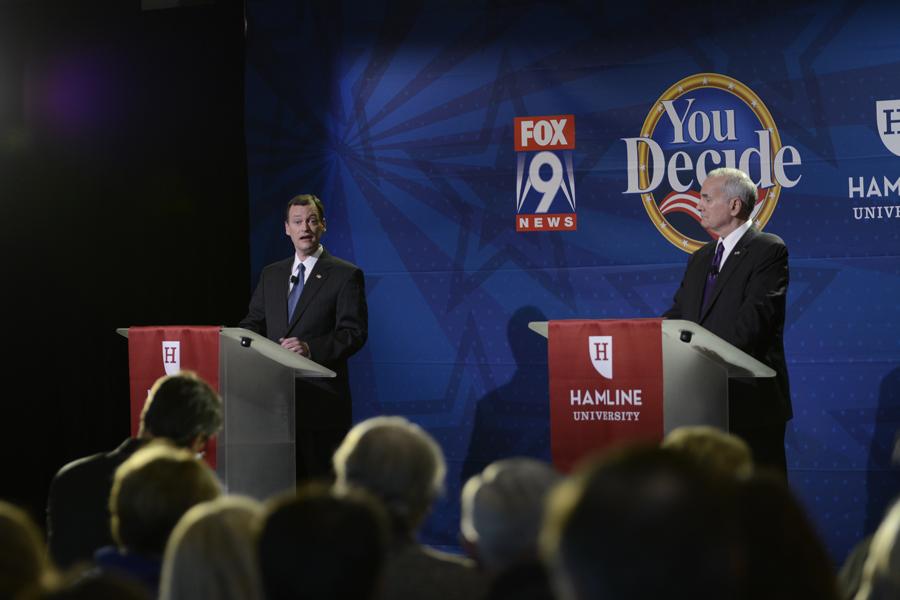Dayton and Johnson face off
Gubernatorial candidates Jeff Johnson and Mark Dayton go head to head in Klas Center.
October 22, 2014
This Sunday, Klas Center’s Kay Fredericks ballroom was the scene of the fourth gubernatorial debate in the 2014 election year, between DFL incumbent Governor Mark Dayton and GOP candidate Commissioner Jeff Johnson. The event was broadcast by FOX9 News, who approached Hamline about providing the location. FOX9 and Hamline have partnered to host this event before, when they held a debate between GOP representative Tom Emmer, Independent representative Tom Horner and Dayton in the 2010 election.
Hamline students, faculty and staff filled the room, which was draped with dark curtains to provide a backdrop for the candidates. After an initial welcome from Hamline President Linda Hanson, FOX9 news anchor and debate moderator Randy Meier invited the candidates to share their opening remarks.
Johnson expressed concern over the state of the Minnesota middle class, and mentioned the need to put “a family budget before a government budget,” while Dayton reminded the audience that Minnesota has seen improvements in the areas of addressing unemployment and education needs since he became governor four years ago.
A table of panelists, composed of Rachel Stassen-Berger from the Star Tribune, Tom Scheck from MPR and Bill Salisbury from the Pioneer Press, posed questions to the candidates. The debate touched on a range of subjects, including the state budget, the job market, gun control laws, health insurance and what to do in the event of an Ebola outbreak.
A couple of Hamline students were given the opportunity to pose a question directly to the candidates. Sophomore Erin Harvey asked how each candidate intended to address student loan debt.
“My generation owes your generation a lot more support,” Dayton said, adding that while he has done some work to increase student financial aid, there is still a lot of progress to be made toward the accessibility of quality higher education. Johnson said that tuition freezes, which have been used to regulate student debt in the past few years, are only a short-term solution. He elaborated on the factors that would need to be evaluated before taking action, such as administrative costs and finding out the average time it takes a student to graduate.
Senior Miiko Taylor asked the candidates about the job outlook for college graduates, in terms of increasing the job market. Dayton referenced the jobs he has already created in Minnesota since 2011, and said he planned to continue in that direction. However, Johnson criticized Dayton, saying that the jobs Dayton created were mostly low-paying or part-time positions. Johnson went on to say that the real problem is the underemployment of overqualified graduates.
“I think we’re leaving too many people behind in this economy,” Johnson said. “Yes, we’re creating jobs but there are too many college grads living in their parents’ basement because they can’t find a job that allows them to pay rent and student loans at the same time. That’s wrong, and we need to take some pretty significant action to fix it.”
The candidates discussed some very serious issues affecting Minnesotans, but the debate wasn’t all fun and no games. One of the panelists asked for the favorite type of fast food of each candidate was. Without hesitation, Dayton answered “Chocolate ice cream,” and Johnson added, “I was going to say DQ Blizzards, so we agree on something today.”
The debate ended with a lightning round of questions, and concluding remarks from each candidate.
Junior Lydia Yahnke attended the debate, and afterward said that the most important parts of the debate to her were the opening remarks and the lightning round.
“The opening remarks because they kind of set up how the rest of the debate would go and showed us each of their own individual styles, and the lightning round because it was fast, they had to move quick, and you got to see how they’d react,” Yahnke said. She felt that Johnson had shown a bit more poise in his responses, but Dayton was obviously more experienced in debating at this level and his responses were well prepared, though at times sounded more rehearsed.
MBA student Daniel Hennen also attended the debate, and was most struck by the moment when the candidates were asked to define the income range of those they considered the middle class.
“There was the question of the middle class, and it seemed like neither candidate had a grasp of what the middle class really is,” Hennen said. “That’s a majority of people in the state. You should have a good grasp of that. Otherwise, I thought the debate went really well.” Hennen commended the candidates ability to relay their respective stances well.
The fifth and final debate between the candidates is scheduled for Oct. 31 on TPT.






